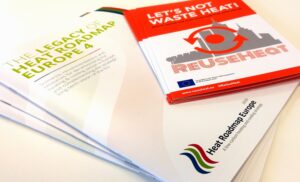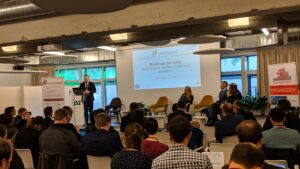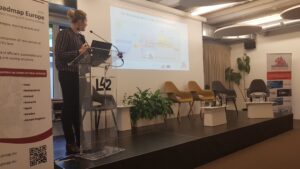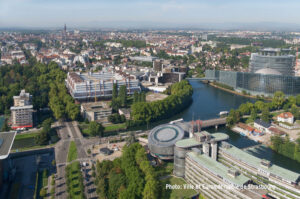Roadmaps are ready: now what?? – Event recap
- News
- 15 February 2019

The aim of Heat Roadmap Europe 4 (HRE4) (March 2016 – February 2019) was to produce the scientific evidence required to effectively support the decarbonisation of the heating and cooling sector across Europe and democratise the debate.
This has been achieved by developing “Heat Roadmaps” for the 14 largest EU countries in terms of heat demand, policy recommendations at national and EU level and business strategies that were presented and discussed on the 13th of February 2019 during the final HRE4 event in Brussels.
Nearly 100 stakeholders from the EU Commission, NGOs, industry, city partners and research institutions took the opportunity to discuss the project results, their policy implications at both the EU and national levels and the challenges of implementation.
Vincent Berrutto, the Executive Agency for SMEs – European Commission, highlighted the growing significance of heating and cooling in EU energy and research policy discussions and the role of EU-funded projects such as HRE4 in his welcome address.
The EU strategic long-term vision for a prosperous, modern, competitive and climate-neutral economy by 2050 was presented by Hans van Steen, Directorate-General for Energy – European Commission. This strategy demonstrates how Europe can lead the way to climate neutrality by investing in realistic technological solutions, empowering citizens and aligning action in key areas such as industrial policy, finance or research. “When we think about the vision for a climate neutral EU, the importance of heating and cooling cannot be overestimated.” – concluded van Steen.
Differences between the EU strategy modelling tools and the HRE4 energy models were underlined by the project coordinator Brian Vad Mathiesen, Aalborg University (Denmark). He questioned the different tools currently used for EU policies for their limited or lack of capacity to model the intermittent nature of renewable energy sources.

“Based on the data, knowledge, methodologies and scenarios developed and published by the HRE4 project, it is clear that the European Union should focus on implementing change. This could be achieved by developing markets for existing technologies and infrastructures to maximise the benefits of energy efficiency.” – added Mathiesen.
In the HRE4 scenarios, reductions in the primary energy supply are created by combining several energy efficiency measures in the form of further end-use savings, district heating and cooling grids and the use of renewable and excess heat sources. This is linked to electrification through a considered distribution of heat pumps. In rural areas, this can be achieved at an individual building level and in the form of large-scale heat pumps in district heating and cooling grids.
“This combination of electrification, thermal grids and energy savings has benefits across the entire energy sector and for the integration and flexibility of renewable energy capacities”, explained Susana Paardekooper, Aalborg University (Denmark) while presenting the HRE4 outcomes.
Key points of the HRE4 research:
|
In addition to interesting presentations from the EU Commission and project partners, a highlight of the event was a vivid panel discussion featuring representatives from cities and industry. They focused on influencing policies and business strategies to enable practical implementations of the HRE4 recommendations.
One of the main achievements of the HRE4 project was to enable sustainable heating and cooling policies at a local level. To the delight of the organisers, the audience actively participated in discussions and representatives from cities and regions confirmed their commitment to implementing sustainable heat transition policies and projects.
 Participants gained an insight into the potential of excess heat recovery as a major source for district energy networks in Europe, as well as business models and bankability of such projects. The latter was the focus of the complementary workshop of the ReUseHeat project (October 2017 – September 2021). This project explicitly builds on the knowledge of HRE4 and intends to overcome both technical and non-technical barriers towards the development of urban waste heat recovery investments across Europe.
Participants gained an insight into the potential of excess heat recovery as a major source for district energy networks in Europe, as well as business models and bankability of such projects. The latter was the focus of the complementary workshop of the ReUseHeat project (October 2017 – September 2021). This project explicitly builds on the knowledge of HRE4 and intends to overcome both technical and non-technical barriers towards the development of urban waste heat recovery investments across Europe.
Key facts about ReUseHeat:
|
The concept of combining the final HRE4 event and the ReUseHeat project workshop was a great success and allowed an exchange among the representatives of public authorities, utility companies, EU, national and local decision-makers and the research community who are all facing the realities of the heat transition.
The event programme and presentations can be viewed here.
Disclaimer:
These projects have received funding from the European Union‘s Horizon 2020 research and innovation programme under grant agreements n°695989 and n°767429. The sole responsibility for the content of this document lies with the author and in no way reflects the views of the European Commission.
Contact:
Aksana Krasatsenka, Project and Communication Officer, Euroheat & Power; [email protected] or +3227402112 (the event organiser)
Brian Vad Mathiesen, Professor, Aalborg University; [email protected] or +4599407218 (HRE4 project coordinator)
Kristina Lygnerud, Energy department manager, IVL – The Swedish Environment Research Institute; [email protected] or +46727086626 (ReUseHeat project coordinator)
Latest News
-

-
 26.10.2021 Celsius Summit 2021 – Energy Democracy
26.10.2021 Celsius Summit 2021 – Energy Democracy

